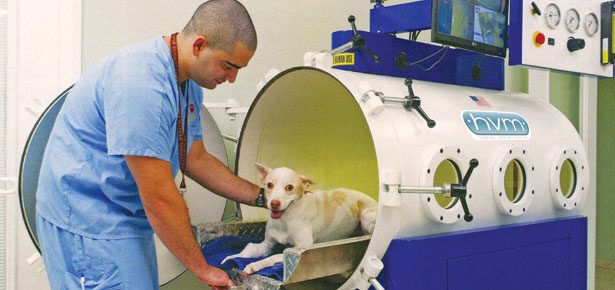

Pill-Popping Pups
Mood-altering drugs and our dogs
It was the early 1980s and Nicholas Dodman of the School of Veterinary Medicine at Tufts University was standing next to a colleague watching a dog that had been brought into the Animal Behavior Clinic. The dog was panting furiously and pacing around the room. It cringed and trembled when it was approached.
Dodman looked up and announced that the dog was clearly feeling anxious. His colleague shook his head and muttered something about the dangers of treating dogs as if they had such human-like feelings. “Dogs don’t experience the same mental states and emotions that people do,” he argued.
Dodman’s colleague was really restating a belief that many scientists have held since the 1600s. It began with René Descartes, a French philosopher, mathematician, and biologist who claimed that only humans have feelings and conscious mental processes. Animals were thought to be simply the equivalent of biological machines with no psychological processes worth mentioning.
Two hundred years later, Charles Darwin, whose theory of evolution changed our view of the biological world, challenged Descartes. He suggested that animals have much the same mental abilities as people, although these may be more limited in scope. Furthermore, he believed that the emotional experiences of animals are quite similar to those of humans.
Dodman was clearly siding with Darwin when he answered his colleague with “Well, how about this? Let’s give the dog an anti anxiety drug and see what happens.”
What happened made history: the dog’s behaviour improved dramatically.
At the biological level of analysis, this is what should have happened. The brain of the dog is very similar to that of humans in many ways. The limbic system, which controls the major emotions, including fear and anger, exists in both species and operates in a similar manner. Furthermore, the basic neural chemistry of dogs and people is the same.
Today, most veterinarians have learned to accept the fact that animals have emotions and can suffer from some of the same emotional problems that people do. These include not only anxiety, but also depression, irrational fears and phobias, anger outbursts, obsessive and compulsive behaviours, and a broad range of neurotic and stress-related problems. Animal behavioural pharmacology is a growing field of research and most veterinarians have been trained how to use psychologically active drugs. Drugs for pets are now big business and the Pfizer Drug Company has established a companion animal division which brought in nearly a billion dollars last year.
For the sake of simplicity, we can divide major psychological problems experienced by dogs into two clusters. The first involves anxiety and stress-related difficulties and the second involves anger and aggression problems. At the neurological level, these apparently very different conditions are closely related. Karen Overall of the Center for Neurobiology and Behavior at the University of Pennsylvania found that dogs with a history of aggressive behaviours normally have higher levels of stress hormones, such as cortisol, in their blood. This is similar to dogs suffering from fear and anxiety. Dogs with aggression problems also show unusual levels of neurotransmitters, These are the chemicals that carry messages from one nerve cell to another including serotonin, dopamine, and the monoamines. Anxious and fearful dogs show the same imbalances in neurotransmitters. Even without the benefit of high-powered chemical analysis systems, animal behaviourists have long recognized the link between anxiety and anger and often speak of “fear-based aggression.”
When a psychologist looks at a behaviour problem in a dog, he or she normally considers two possible sources of the difficulty. The first has to do with the animal’s experiences and personal history. Dogs that have not been adequately socialized or have been treated harshly by their owners or suffered from traumas often develop psychological problems. However, some dogs, like people, can have an imbalance of vital chemicals in their brain. Common human conditions ranging from clinical depression to anger management difficulties exist in dogs and may result from similar chemical imbalances.
How widespread such conditions are in pets is difficult to determine. Sainsbury’s Pet Insurance in the United Kingdom has been collecting data on this subject and they suggest that depression and anxiety are widespread in the British canine population. They found that 623,000 dogs and cats in the UK had suffered mentally in the previous year, while more than 900,000 suffered loss of appetite because of stress or emotional problems.
Deficits in serotonin, a hormone that serves as a neurotransmitter, seem to play an important role in the control of aggression and mood changes in the brain, especially when certain other conditions that affect impulsive behaviours are present. Restoring the chemical balance is not easy, since serotonin can’t successfully be administered as a shot or pill. In human beings, there has been a good deal of success controlling such conditions with drugs that keep the serotonin already in the brain from being broken down and reabsorbed around the nerve endings. This, in effect, increases the amount of serotonin available for use by the neural system. The class of drugs that do this is known as “serotonin reuptake inhibitors” or SRI’s. The best known of these is Prozac.
When faced with psychological problems in dogs, veterinarians such as Dodman turned to the drugs designed for people. Just as he had predicted, Prozac in various forms not only successfully controlled anxiety-related problems in dogs but also helped reduce some forms of aggression. This prompted Eli Lilly, the company that manufactures Prozac, to create a chewable, beef-flavoured version of the medication specifically designed for dogs.
There are, of course, purely behavioural treatments for many psychological problems in dogs, including those related to fear and anger. However, these are often time-consuming and require owners to change their routines and the way that they interact with their dogs. Popping the dog a pill is thus an attractive alternative to many. It also relieves the owner of any potential guilty thoughts that their own behaviours and actions may have caused or contributed to their dog’s difficulties.
Unfortunately, these drugs are not the perfect solution. By law, only veterinarians can prescribe such medications and they are expensive. SRI’s do not cure the problems overnight, but often take three to six weeks before any improvement is noticed. Furthermore, the drugs must be administered regularly for the effect to build up. If the course of medication is interrupted for a few days, the benefits are lost and you face several weeks of treatment before they will be restored.
The available data, based on reports from dog owners, suggests that drugs help in 50 to 60 percent of cases of extreme phobia or severe separation anxiety, and in 75 to 90 percent of cases of aggression. Sometimes the failure of the drug to provide a long-term solution comes about because the dogs’ owners stop administering the medication when the symptoms finally go away, while others may feel that the medication isn’t working when the problem doesn’t disappear after the first week or so of using the drug.
If you suspect that your dog’s brain chemistry is the cause of his aggression and mood swings, there is something that you can do that is less expensive than veterinary treatment and also can be used as an aid if you are going to try behavioural treatments for such problems. The first involves 5-Hydroxytryptophan (5-HTP), a naturally occurring amino acid used by the body in the manufacture of serotonin. In North America, it is marketed as a dietary supplement and is available over the counter in health-food stores and some pharmacies. It is designed for people who want an antidepressant and something that may aid in sleep, but it works by effectively increasing the production of serotonin in the nerve endings and therefore can help reduce anxiety and aggressive tendencies in many dogs. As in the case of Prozac, the effects may not be seen until the treatment has gone on for up to six weeks, and if you stop administering it at any time, you lose any benefits and must start over. Doses of 5-HTP are often recommended as a “booster” along with behavioural treatment of these problems.
One non-drug treatment that specifically targets aggression is still being researched but appears promising. At Tufts University, a team of researchers switched dogs to low-protein, preservative-free diets and found that the diet seemed to reduce certain types of aggression in a reasonable percentage of dogs. Changing your aggressive dog’s diet in this way is worth a try because if it works for your pet, you’ll see the effects within a week or so and you don’t have much to lose.
Most dog owners don’t really care why a drug works as long as it controls their dog’s behavioural problem. Sometimes the nature of this control is a surprise to the veterinarian.
Take the case of Joco, a Parson Russell Terrier, whose problem was telephones. Whenever one rang, he would dash over to the sound, jump up on the furniture, and then attack the phone. This was driving his owner to distraction and Joco’s very existence was threatened.
Joco’s veterinarian treated this as an anxiety-triggered aggression problem and prescribed a Prozac type of medication, but it didn’t seem to work. Therefore, he raised the dosage and also prescribed another drug that he hoped might calm the dog. A few weeks later, he called Joco’s owner to check up on the effectiveness of the treatment.
The dog’s happy owner reported, “The medication really did solve the problem. Now Joco is so groggy all the time that he can’t reach the phone in time to do any damage!”
Join the newsletter and never miss out on dog content again!
"*" indicates required fields
By clicking the arrow, you agree to our web Terms of Use and Privacy & Cookie Policy. Easy unsubscribe links are provided in every email.





